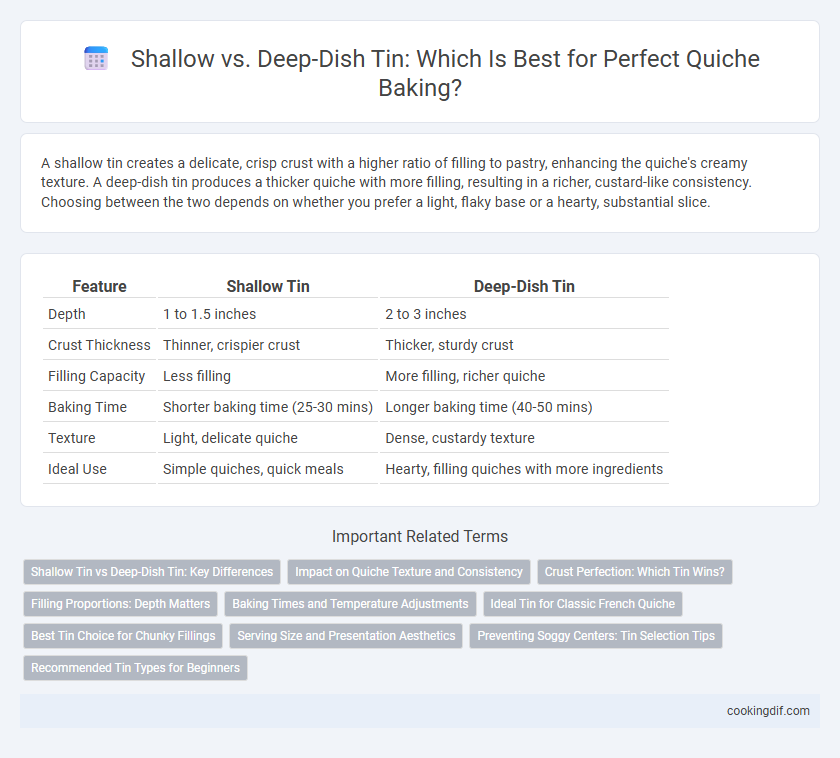A shallow tin creates a delicate, crisp crust with a higher ratio of filling to pastry, enhancing the quiche's creamy texture. A deep-dish tin produces a thicker quiche with more filling, resulting in a richer, custard-like consistency. Choosing between the two depends on whether you prefer a light, flaky base or a hearty, substantial slice.
Table of Comparison
| Feature | Shallow Tin | Deep-Dish Tin |
|---|---|---|
| Depth | 1 to 1.5 inches | 2 to 3 inches |
| Crust Thickness | Thinner, crispier crust | Thicker, sturdy crust |
| Filling Capacity | Less filling | More filling, richer quiche |
| Baking Time | Shorter baking time (25-30 mins) | Longer baking time (40-50 mins) |
| Texture | Light, delicate quiche | Dense, custardy texture |
| Ideal Use | Simple quiches, quick meals | Hearty, filling quiches with more ingredients |
Shallow Tin vs Deep-Dish Tin: Key Differences
Shallow tins, typically 1 to 1.5 inches deep, produce quiches with a crispier crust and a more balanced ratio of filling to pastry, ideal for delicate custards and evenly cooked quiche Lorraine. Deep-dish tins, ranging from 2 to 3 inches deep, allow for thicker fillings with additional ingredients, resulting in a richer, heartier quiche but require longer baking times to ensure the center is fully cooked. Choosing between shallow and deep-dish tins impacts texture, cooking duration, and presentation, with shallow tins emphasizing a lighter, crisp quiche and deep-dish tins yielding a more substantial, custard-filled dish.
Impact on Quiche Texture and Consistency
Using a shallow tin for quiche baking typically results in a quicker, more evenly cooked filling with a crispier crust, enhancing a light and creamy texture. In contrast, a deep-dish tin produces a thicker quiche with a denser, custard-like consistency that requires longer baking to ensure the center is fully set. Choosing between shallow and deep tins significantly impacts the quiche's moisture distribution and firmness, influencing the overall mouthfeel and taste experience.
Crust Perfection: Which Tin Wins?
A shallow tin promotes a crisp, evenly baked crust by allowing heat to circulate effectively and reducing moisture buildup, enhancing the quiche's texture. Deep-dish tins, while accommodating more filling, can lead to a softer, sometimes soggy crust due to prolonged baking and trapped steam. For crust perfection, a shallow tin consistently achieves a golden, flaky finish preferred by quiche aficionados.
Filling Proportions: Depth Matters
Shallow tins create a thinner quiche filling that bakes more evenly and crisply, highlighting delicate textures and balanced flavors. Deep-dish tins allow for a thicker filling, accommodating more ingredients but requiring longer bake times to ensure the custard sets properly. Depth significantly influences the ratio of crust to filling, impacting the overall taste and texture experience in quiche baking.
Baking Times and Temperature Adjustments
Shallow tins, typically around 1 inch deep, require shorter baking times of approximately 25-30 minutes at 350degF (175degC) due to faster heat penetration, yielding a crispier crust and evenly set filling. Deep-dish tins, which are 2 inches or deeper, need longer baking times ranging from 40-50 minutes at a slightly lower temperature around 325degF (160degC) to prevent over-browning while ensuring the thicker filling cooks thoroughly. Adjusting temperature and duration based on tin depth is crucial for achieving ideal texture and flavor in quiche.
Ideal Tin for Classic French Quiche
A shallow tin, typically 1 to 1.5 inches deep, is ideal for classic French quiche as it ensures even baking and a crisp, golden crust without sogginess. Deep-dish tins, around 2.5 to 3 inches deep, retain more filling but may cause uneven cooking and a denser texture, less authentic to traditional quiche Lorraine or quiche Florentine. Using a shallow tart tin helps achieve the perfect balance of delicate pastry and creamy, well-set custard characteristic of authentic French quiches.
Best Tin Choice for Chunky Fillings
A deep-dish tin is the best choice for quiche with chunky fillings, as its larger depth accommodates thick layers of vegetables, meats, and cheeses without spilling. Shallow tins, usually around 1 inch deep, may cause overflows and uneven cooking when filled with heavy, dense ingredients. Using a deep-dish tin ensures even heat distribution and a perfectly set quiche with a golden, crisp crust.
Serving Size and Presentation Aesthetics
A shallow tin produces a quiche with a thinner, more delicate crust and evenly cooked filling, ideal for smaller serving portions and elegant presentation at brunch or formal gatherings. Deep-dish tins create a taller, heartier quiche that holds more ingredients, making it suitable for larger servings and a rustic, robust appearance that appeals to casual dining settings. Choosing between shallow and deep-dish tins affects portion control, texture balance, and visual appeal, tailoring the quiche experience to specific serving occasions and guest expectations.
Preventing Soggy Centers: Tin Selection Tips
Choosing the right tin is vital for preventing soggy centers in quiche baking; shallow tins promote even heat distribution, ensuring a crisp crust and fully cooked filling. Deep-dish tins can trap moisture, increasing the risk of a soggy bottom unless pre-baked or lined with parchment. Opting for a metal shallow tin with good thermal conductivity improves browning and texture, delivering a perfectly set quiche center.
Recommended Tin Types for Beginners
Shallow tins are ideal for beginners baking quiche because they allow even heat distribution, ensuring the crust cooks thoroughly without burning. Deep-dish tins, while offering thicker filling layers, often require longer cooking times and careful temperature control, which can be challenging for novice bakers. Opting for a shallow tin helps achieve a perfectly set filling and crisp crust, making it a practical choice for those new to quiche baking.
Shallow tin vs deep-dish tin for quiche baking Infographic

 cookingdif.com
cookingdif.com